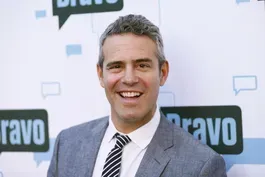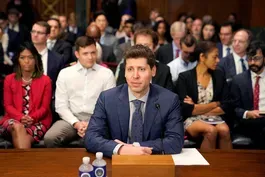
Biden, GOP leaders make little progress on debt ceiling deal
Clip: 5/16/2023 | 8m 5sVideo has Closed Captions
Biden and GOP leaders meet but make little progress on debt ceiling deal
Republican and Democratic leaders from both the House and the Senate met with President Biden in the Oval Office Tuesday to discuss the debt ceiling. Shortly after, Biden and Speaker of the House Kevin McCarthy both acknowledged the two parties are at a stalemate on some key issues. Congressional Correspondent Lisa Desjardins and White House Correspondent Laura Barrón-López report.
Problems with Closed Captions? Closed Captioning Feedback
Problems with Closed Captions? Closed Captioning Feedback
Major corporate funding for the PBS News Hour is provided by BDO, BNSF, Consumer Cellular, American Cruise Lines, and Raymond James. Funding for the PBS NewsHour Weekend is provided by...

Biden, GOP leaders make little progress on debt ceiling deal
Clip: 5/16/2023 | 8m 5sVideo has Closed Captions
Republican and Democratic leaders from both the House and the Senate met with President Biden in the Oval Office Tuesday to discuss the debt ceiling. Shortly after, Biden and Speaker of the House Kevin McCarthy both acknowledged the two parties are at a stalemate on some key issues. Congressional Correspondent Lisa Desjardins and White House Correspondent Laura Barrón-López report.
Problems with Closed Captions? Closed Captioning Feedback
How to Watch PBS News Hour
PBS News Hour is available to stream on pbs.org and the free PBS App, available on iPhone, Apple TV, Android TV, Android smartphones, Amazon Fire TV, Amazon Fire Tablet, Roku, Samsung Smart TV, and Vizio.
Providing Support for PBS.org
Learn Moreabout PBS online sponsorshipWILLIAM BRANGHAM: Welcome to the "NewsHour."
President Biden is cutting short his upcoming trip to Asia to continue negotiations to avoid a historic default for the country.
Pressure is mounting because the government could run out of money to pay its bills by June 1 if an agreement is not struck by then.
Biden announced the change to his schedule hours after meeting with congressional leaders on raising the debt limit.
JOE BIDEN, President of the United States: I'm confident we're going to continue to make progress toward avoiding default and fulfilling America's responsibility as a leader on the world stage.
However, I'm cutting my trip short.
I'm postponing the Australia portion of the trip and my stop in Papua New Guinea in order to be back for the final negotiations with congressional leaders.
REP. KEVIN MCCARTHY (R-CA): House Republicans passed a bill that raised the debt ceiling, limited our future spending, saved taxpayers money by being able to pull back unspent money and waste and actually grow our economy by making our economy stronger, and helping lifting people out of poverty into work.
And so those are the parameters we will talk about.
WILLIAM BRANGHAM: That was House Speaker Kevin McCarthy speaking after their meeting with the president.
Following these negotiations closely are our congressional reporter Lisa Desjardins and White House reporter Laura Barron-Lopez.
Thank you both so much for being here.
Laura, first to you.
So, the president cut short his upcoming trip abroad.
Clearly, he seems to be feeling the pressure that he has got to deliver on these negotiations.
LAURA BARRON-LOPEZ: That's right, William.
The president exited the meeting today saying that it was productive, but Treasury Department has stressed that X-date is June 1, and it is just around the corner.
Now, the president does not take the cutting short of this trip lightly.
The White House stressed that the president wants to reinvigorate the Quad.
That is a partnership meeting that was supposed to take place in Australia that he will be missing.
That's between the United States, Australia, Japan, and India.
And he will also be missing what would have been the first ever trip by a president to Papua New Guinea.
And the president wanted to focus there because of trying to pay more attention to the Pacific region.
WILLIAM BRANGHAM: So, he's not going to make that part of the trip.
What is it, from your reporting, that you understand is the White House's current position?
What's on the table in these negotiations?
LAURA BARRON-LOPEZ: So, exiting this meeting, the White House, be it the president or his senior staff, have said over and over again that the debt ceiling talks and the budget talks are on parallel tracks, but that they're separate.
But we can report that we know a bit of the details about what's on the negotiating table when it comes to the budget.
This is based off of what the president and Speaker McCarthy have publicly hinted, as well as what sources have told me and Lisa.
And those details, what's on the table are budget caps for at least two years, an ease in energy permitting processes, work requirements for certain government aid programs, as well as a return of some $30 billion in unused COVID money.
And in addition to that, one change today, William, that a White House official confirmed to me is that there will be three new White House officials, Steve Ricchetti, counselor to the president, Shalanda Young, head of the Office of Management and Budget, as well as Louisa Terrell, who is the head of legislative affairs for the White House.
They are going to be the three new leaders for -- designated by the president to negotiate directly with Speaker McCarthy's team.
WILLIAM BRANGHAM: And, Lisa, what is your understanding now about where the Republicans are after this meeting?
LISA DESJARDINS: Republicans walked away quite happy tonight, William, because one thing they wanted they got, which was direct talks with the Biden White House, no more negotiating with everyone else, including Senate Leader McConnell for the Republicans or Hakeem Jeffries from the House side, Democrats.
This will be between the two major sources of power in this -- in the city, House Republicans and the White House.
And there's something significant too about who House Republicans will be having negotiating on behalf.
One of their negotiators is Louisiana Republican Representative Garret Graves.
He's someone who was a longtime Hill staffer, importantly, on the Energy and Commerce Committee.
He's from Baton Rouge, William, and that's significant, because one of the top issues for Garret Graves, one of the things he's an expert at is that permitting reform that Laura just talked about So, and we look at what issues are going to be more important going down potentially the homestretch here, permitting reform.
That could affect energy drilling environment.
All of that, to me, I think is rising very quickly now.
House Republicans say they're unified.
And they do see this as debt ceiling and budget talks together.
And I think we're still going to face a stare-down, but they're happy today that now, from their point of view, the real negotiations are starting.
WILLIAM BRANGHAM: And, Lisa, one of the other things that Laura mentioned that Republicans seem to want is, they want to add more work requirements to people who are receiving federal aid or assistance.
Can you remind us the details of what they want there?
LISA DESJARDINS: Let me take you through that?
There are several different programs that could be affected here.
Here's what House Republicans are proposing.
First, they would like to take -- they would like to apply all of this to able-bodied adults who have no dependents at all.
Now, first, let's talk about the program.
Our viewers know SNAP used to be called food stamps.
Republicans would like to extend work requirements to older group, 50-to-55-year-olds in order to receive those food stamps.
TANF, that is a program for families, the poorest of the poor.
They want to tighten enforcement of that by the states, tighten the work force requirements there.
And then Medicaid, this is the most significant in a way.
Medicaid right now does not have any work requirements.
That is the health care program, largely for the poor in America.
Republicans would like 80 hours of work a month, and they would like that to apply to 18-to-55-year-olds.
That is something that progressives have an outcry on, but Republicans say that they think this would save money, and they like the idea of, they think, getting more people to work.
WILLIAM BRANGHAM: And, Laura, what is your sense?
I mean, Lisa says that the progressives in the Democratic Party don't like those changes.
What is your understanding of what the White House thinks about adding these requirements to aid?
LAURA BARRON-LOPEZ: That's right, William.
Progressives have been squeezing the president on this one front, in particular, on work requirements.
And after the president felt a bit of pressure from those within his party, he publicly made clear that, when it comes to work requirements, he's only open to those that cover cash assistance programs.
He is not open to work requirements for SNAP, for food assistance, and he's not open to work requirements for Medicaid.
So, this is something that the president has felt a bit of pressure on from his left flank.
But when it comes to moderate Democrats, they're relatively on board with this as a part of the larger piece of negotiations.
WILLIAM BRANGHAM: And, Lisa, lastly to you.
There's this looming calendar issue here.
June 1 is this coming deadline.
Do they have time to get this done?
LISA DESJARDINS: Let's just take a look at how little time there is left.
First of all, everyone knows, today, May 16, if you look at that on the calendar, here's the deadline, June 1.
That is the earliest that we could hit the debt ceiling, but it looks like it might be right around then.
Here's why that two weeks is even less than people think.
Look at that.
That next week is when the Senate is supposed to be gone.
The Senate needs a week, William, to pass any major legislation.
They have got to get going now.
I do think there's reason to believe the Senate will stick around next week for this.
Garret Graves, the man I mentioned earlier, he told me earlier today he thinks a deal can get done in three days' time if the talks are actually productive and even-handed.
We will watch, because that's basically about as much time as they have to get a real bill moving.
WILLIAM BRANGHAM: That is a very big if looming on the calendar.
Lisa and Laura, it's so good to see you both.
Thank you very much.
Andy Cohen on his latest adventure as the father of two kids
Video has Closed Captions
Clip: 5/16/2023 | 8m 10s | Andy Cohen on his latest adventure as the father of two kids (8m 10s)
MLK biography reveals new details about civil rights leader
Video has Closed Captions
Clip: 5/16/2023 | 8m 34s | New MLK Jr. biography reveals civil rights leader was misquoted in criticism of Malcolm X (8m 34s)
OpenAI CEO tells lawmakers AI regulation is needed
Video has Closed Captions
Clip: 5/16/2023 | 10m 55s | Why artificial intelligence developers say regulation is needed to keep AI in check (10m 55s)
Schools hope apprenticeships will alleviate teacher shortage
Video has Closed Captions
Clip: 5/16/2023 | 7m 20s | School administrators hope apprenticeship programs will alleviate teacher shortages (7m 20s)
Why the northern lights are being seen further south
Video has Closed Captions
Clip: 5/16/2023 | 2m 36s | Why the northern lights are being seen further south (2m 36s)
Providing Support for PBS.org
Learn Moreabout PBS online sponsorshipSupport for PBS provided by:
Major corporate funding for the PBS News Hour is provided by BDO, BNSF, Consumer Cellular, American Cruise Lines, and Raymond James. Funding for the PBS NewsHour Weekend is provided by...















